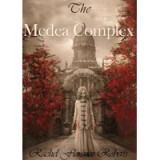
The Medea Complex by Rachel Florence Roberts
Positives
Negatives
In the ancient Greek play Medea by Euripides, the title character slaughters her children in retribution for her husband abandoning her. At the end of the play, a dragon-pulled chariot spirits Medea away, and she goes unpunished for her crimes. In the novel The Medea Complex, author Rachel Florence Roberts has partially modeled her main character, Lady Anne Stanbury, after the ancient Medea; Anne also stands accused of infanticide. Yet Roberts’s book focuses more on the aftermath of a woman killing her child than what led up to such a horrific event.
In 1885 in England, Lady Anne Stanbury is found guilty of murdering her only child. The authorities commit her to Bethlem Hospital, an insane asylum, instead of sending her to prison. Delusional, Anne believes that she has been kidnapped and will be released when her wealthy father, Lord Damsbridge, pays the ransom her captors want. Dr. George Savage, who runs the hospital, has the arduous task of trying to restore Anne to her senses in the hopes that she can be released to her grieving husband, Edgar.
Eventually, Anne does regain her sanity, but the very night she returns home, she goes missing. When the police arrive on the scene to investigate Anne’s disappearance, they discover a patch of blood in the garden; is it enough blood to presume she is dead, and if so, where is the body? Edgar comes under suspicion for Anne’s death because her lady’s maid and other household staff attest that Edgar never forgave his wife for murdering their son. But did he do it? And if not, where is Anne?
The Medea Complex has gotten mixed reviews on both Goodreads and Amazon. Readers either love the book or hate it, and both groups have good reason to feel the way they do. On the positive side, the novel has a good plotline. It is a psychological thriller of sorts, told in shifting points-of-view, but one must remember that some of the characters are diagnosed as insane; therefore, their reliability as narrators must be questioned. The slow unraveling of the different characters telling their portions of the story forces the reader not to have a clear picture of all events until the end of the book, and while the ending may be a surprise to some, others will figure out beforehand, through the title of the book if nothing else, the truth of the situation.
Those who have berated the book also have cause to do so. The writing is infuriating at times. For example, Victorian-era men may have thought the way the good doctor does, but his view regarding women seems more of a throwback to medieval times than the 1800s. Dr. Savage has strong opinions regarding women who read a great deal. At one point, he finds out that Anne had been reading medical journals in the hopes to learn enough not to miscarry a second time. Regarding this information, Dr. Savage writes in his journal:
Other parts of the writing are weak as well. For example, during Anne and Edgar’s journey back home following her release from the asylum, Anne notices her surroundings, and through her mental musings, she notes, “Nightfall will soon fall, and the streets are as empty as my heart.” Another area where the writing is problematic is in the section where Roberts gives a slight nod to Edgar Allan Poe’s “The Raven.” As Anne’s husband slowly wakes from a dream in which he is missing his now presumed dead wife, he discovers a bird relentlessly pecking at his window.
While the overall plotline of the story is strong, the work as a whole is just not developed enough. One wants and needs more of several characters’ backstories, such as Edgar’s father and Anne’s maid Beatrix. Their roles are important, but the characters are not fleshed out the way they should be.
Although the work is touted as being based on a true story, according to the final pages of the book, the author claims that only a few of the characters actually existed, and Lady Anne is not one of them. In truth, she is a composite of other women whose stories the author read or studied. While that may not register on some readers’ irritability scale, it did on mine. I tried to find the true story online only to discover at the end of the book that Lady Anne Stanbury never existed.
A pleasure for some, an annoyance for others, The Medea Complex is an intriguing idea that falls short.


